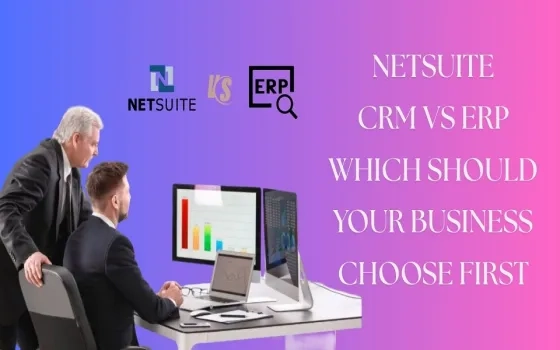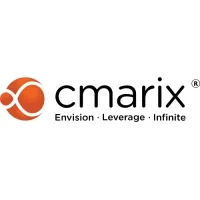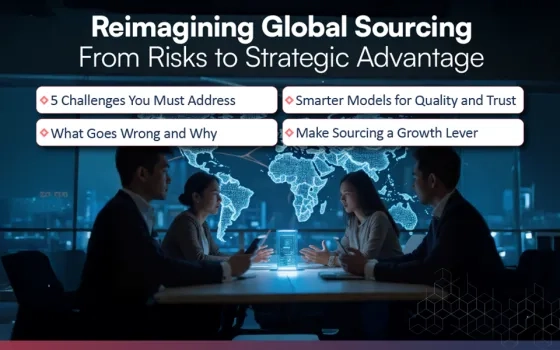Most business leaders get confused when they first encounter NetSuite. Is it a CRM? An ERP? The answer is both, but that's where the confusion starts.
NetSuite operates as a comprehensive cloud-based business solution that houses both customer relationship management and enterprise resource planning capabilities under one roof. Here's the thing - while many businesses think they need to choose between CRM and ERP functionality, NetSuite's integrated approach means you can leverage both systems simultaneously.
The real question isn't whether NetSuite is a CRM or ERP. What matters is understanding how each component works and which features align with your business needs. Let's break down what NetSuite CRM vs ERP really means for your operations.
What is NetSuite CRM?
NetSuite's CRM component focuses entirely on your customer-facing operations. The core CRM functionalities revolve around three pillars: lead management, opportunity tracking, and contact management. Your sales team can capture leads from various channels, track every touchpoint until conversion, and nurture them through automated sequences.
The system maintains detailed customer profiles that include purchase history, behavioral data, and communication logs.
Customer lifecycle tracking becomes smooth when you can see the entire journey from initial prospecting through post-sales support. Your team gains visibility into which marketing campaigns generate quality leads, where customers might need additional support, and how long deals typically take to close.
Key features that make NetSuite CRM powerful include:
Sales force automation handles quote generation, proposal tracking, and commission calculations. Your sales representative spends less time on administrative tasks and more time actually selling.
Marketing automation manages email campaigns, lead scoring, and campaign ROI tracking. You can make targeted campaigns based on customer segments and track which messages resonate with different audiences.
Customer service management centralizes support tickets, knowledge bases, and service level agreements. When customers need help, your support team has immediate access to their complete history.
Many businesses looking to maximize their CRM implementation choose to hire NetSuite developers who can customize workflows and integrate third-party tools for enhanced functionality.
What is NetSuite ERP?
While CRM handles customer relationships, NetSuite ERP manages everything that happens behind the scenes. This is your back-office powerhouse that keeps operations running smoothly.
Core ERP functionalities center on financial management, inventory control, and supply chain coordination. Every transaction, whether it's a purchase order, invoice, or inventory adjustment, flows through the ERP system to maintain accurate records and automate routine processes.
Streamlined back-office operations mean your finance team can close books faster, your warehouse can fulfill orders more efficiently, and your procurement team can optimize vendor relationships. Everything connects to give real-time visibility into your business performance.
Key ERP features include:
Accounting and finance modules handle general ledger, financial reporting,
accounts payable, and accounts receivable. Month-end closes that used to take weeks can now happen in days.
Order and inventory management tracks stock levels, automates reorder points, and manages fulfillment across multiple locations. You'll know exactly what's in stock, what's on order, and when items will arrive.
HR and payroll capabilities manage employee records, time tracking, benefits administration, and compliance reporting. Your HR team gains self-service portals and automated workflows.
Differences between CRM and ERP
The major difference comes down to focus areas. CRM concentrates on front-end customer interactions while ERP handles back-end operational processes. Both systems share data, but they serve different user groups and business objectives.
Feature
|
CRM
|
ERP
|
|
Focus
|
Customer relationships
|
Core business processes
|
|
Primary Users
|
Sales, marketing, and service teams
|
Finance, HR, and supply chain teams
|
|
Main Outcome
|
Improved customer experience
|
Operational efficiency
|
|
Data Type
|
Customer interactions, sales pipeline
|
Financial transactions, inventory levels
|
|
Reporting
|
Sales forecasts, campaign performance
|
Financial statements, operational metrics
|
CRM users generally include sales representatives, marketing managers, and customer service agents who need detailed customer insights.ERP users encompass accountants, procurement specialists, warehouse managers, and HR personnel who require operational data.
The beauty of NetSuite's integrated approach is that both systems share the same database. When a salesperson closes a deal in CRM, the order automatically flows to ERP for fulfillment and invoicing. This NetSuite business software comparison shows how unified platforms outperform disconnected systems.
Benefits of Using NetSuite CRM & ERP Together
Unified Data Management
Integration eliminates the data silos that plague businesses using separate systems. Your customer service team can see order status, shipping information, and payment history without switching between applications. Sales teams can access real-time inventory levels when making commitments to customers. A single source of truth means everyone works from the same dataset. When marketing runs a promotion, sales sees the updated pricing immediately. When finance processes a refund, customer service gets notified automatically.
Seamless Cross-Department Collaboration
Enhanced collaboration happens naturally when departments share common workflows. The CRM vs ERP features in NetSuite work together rather than competing for attention. Marketing qualified leads flow seamlessly to sales, closed deals trigger fulfillment processes, and delivered orders initiate customer success workflows. Teams spend less time coordinating between systems and more time serving customers effectively.
Process Automation and Efficiency
Automated workflows reduce manual tasks across the organization. Invoice approvals, commission calculations, and inventory replenishment happen automatically based on predefined rules. Your team must focus on strategic activities rather than routine data entry. This automation reduces human errors and accelerates business processes from order to cash.
Built-in Scalability
Scalability becomes less of a concern when your systems grow together.
Adding new users, locations or product lines doesn't require separate integrations or data migrations. The platform adapts to your business growth without forcing you to rebuild your technology stack or retrain your teams on multiple systems.
Real-World Examples and Impact
A mid-sized manufacturing company implemented NetSuite CRM to improve its 18-month sales cycle. By tracking every customer interaction and automating follow-up sequences, they reduced their average deal closure time by 35%. Sales productivity increased because reps could focus on high-value activities rather than administrative tasks.
An e-commerce retailer used NetSuite ERP to automate their fulfillment process across three warehouses. Order processing time dropped from 48 hours to 4 hours, and inventory accuracy improved to 99.7%. The eCommerce software development company they partnered with helped customize the system for their specific workflow requirements.
A professional services firm integrated both CRM and ERP to create a unified client experience. Project managers could access client communication history while finance tracked project profitability in real-time. Client satisfaction scores improved by 28% because the entire team had visibility into client needs and project status.
Making the Right Choice for Your Business
NetSuite CRM vs ERP isn't really a choice you need to make. The question is which components you'll implement first and how quickly you'll expand to leverage the full platform.
Start with your biggest pain points. If sales teams struggle with lead management and customer tracking, begin with CRM features. If operational inefficiencies are holding back growth, focus on ERP implementation first.
What this really means is that NetSuite's integrated approach gives you flexibility to grow at your own pace while maintaining data consistency across all business functions. You're not locked into separate systems that may not communicate effectively down the road.
The most successful NetSuite implementations recognize that CRM and ERP work better together than apart. Your business gets the customer insights needed to drive growth, plus the operational efficiency required to scale sustainably.
Conclusion
NetSuite's dual CRM and ERP capabilities represent more than just software features; they're strategic business tools that reshape how companies operate. The platform's strength lies not in forcing you to choose between customer management and operational efficiency, but in showing how these functions amplify each other when properly integrated.
Smart businesses recognize this isn't about CRM versus ERP anymore. Modern market dynamics demand both customer intimacy and operational excellence. NetSuite gives this combination through a unified platform that evolves with your business needs.
Whether you're a growing startup needing better customer tracking or an established company seeking operational streamlining, NetSuite's integrated approach removes the complexity of managing multiple disconnected systems. The result is a business that responds faster to market changes, serves customers more effectively, and scales more efficiently than competitors stuck with fragmented solutions.















